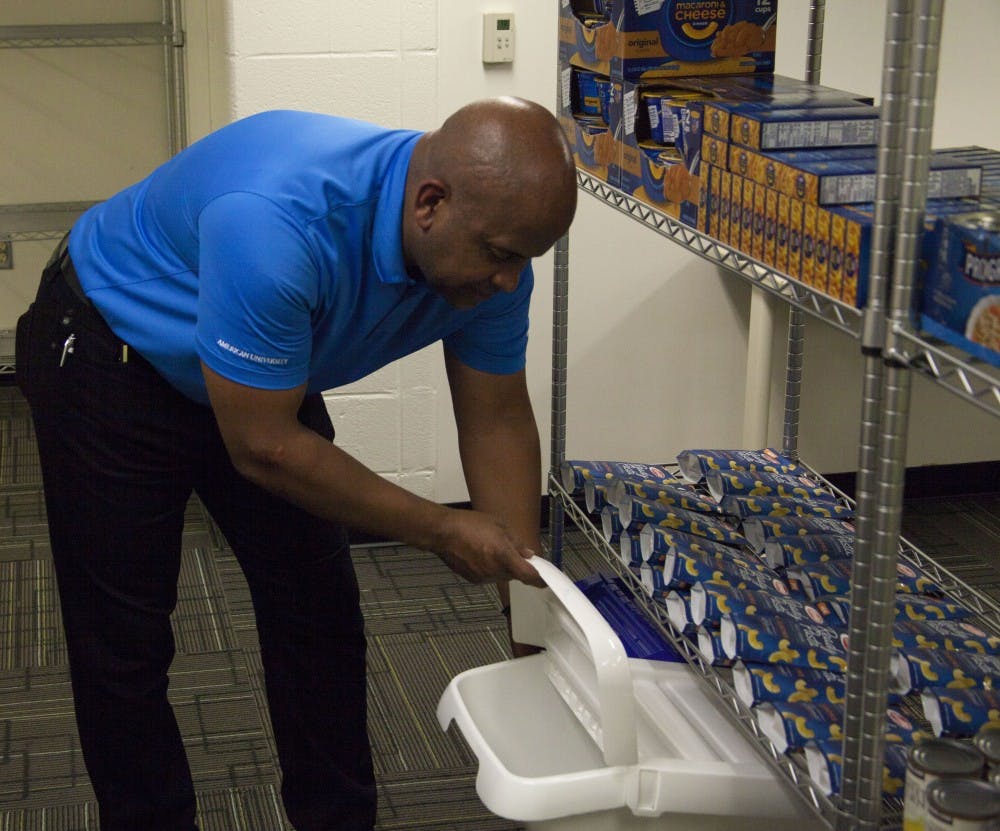During a time when American University students no longer have meal plans and are economically burdened, a food pantry on campus is stepping up to help students in need.
The Market was launched in 2017 after a student-initiated survey found that too many students went hungry because they couldn’t afford to eat. Since then, students have been able to access the pantry using their AU One Card on the basis of an honors system.
Although the coronavirus pandemic caused AU to shift to fully virtual classes this past spring, summer and fall, some students who received emergency housing still live on campus, and many live off campus in the surrounding area.
Tony Hollinger, director of Military-affiliate Support and Special Initiatives with the Office of Campus Life, runs the pantry and said that there have been some changes to how The Market operates, so it is more accessible to students.
These changes include 24/7 access for students, instead of only being open for 18 hours a day. Students who live in emergency housing also received automatic access instead of having to fill out a Google form.
“We’ve been working even closer with Residence Life to make sure that we’re aware of any student status of those who are staying on campus and off-campus because we still have students who are in the D.C. area who are interested in The Market, even though they don’t live on campus,” Hollinger said.
Hollinger said that despite there not being the same amount of students and staff on campus, The Market has still received a steady flow of donations and number of students who come in each day. Hollinger said that many staff members have reached out to him more than ever before.
AU’s dining service Chartwells donated much of what it would have stocked The Eagle’s Nest with in the beginning of the semester, Hollinger said, including core food items such as pasta, breads, soups, canned vegetables and other non-perishable snacks and meals. The refrigerated section is harder to maintain and relies on more communication with students as to when they are going to access it, he said.
Hollinger said that he’s glad to have the overwhelming support of volunteers and staff, along with a partnership with a course about food justice.
Professor Celeste Davis teaches a Complex Problems course called Food Justice Matters, which explores food justice issues and what D.C. and other states are doing to address food insecurity. She decided to partner up with The Market to show students what food insecurity looks like on college campuses.
“Being at AU, they could see, ‘Oh, I might come from privilege, but not everyone does and I actually care about the people that I'm in school with’ so then that kind of opens up a more humanistic point of view,” Davis said.
She now splits her students into three teams for their final project to understand how the pantry operates and how it can be improved. She said that students learned the advocacy, outreach and community service aspects of running The Market and then created a website to serve as a piece of advocacy that could be used by the school.
Davis said that food insecurity is more prevalent than usual during the coronavirus pandemic. According to a report released by the Capital Area Food Bank in July, the number of people who will experience food insecurity in the DMV area will rise by 48 to 60 percent because of the pandemic.
“But the issue is so much more pervasive than that then when you have a crisis like COVID,” Davis said. “You realize that the system is so inherently flawed, that you can't meet all the demands in what's happening as we're still trying to rely on just the goodwill of people to help fill this void, where there should be more policy in government infrastructure there.”
AU students aren’t the only ones relying on charitable donations if they are facing food insecurity — according to Feeding America, 71 percent of college students are “nontraditional,” which means they may be financially independent or work part-time or full-time jobs, opening them up to more financial vulnerability when having to purchase their own food, especially during a time when many students lost their jobs.
Davis suggested that students who are facing this dilemma should utilize food pantries and apply for Supplemental Nutrition Assistance Program benefits, formerly known as food stamps. However, she said that she hopes this is a “rallying call” for a long-term government solution to food insecurity.
The Market will remain open during all hours of the day and week, and students can obtain swipe access through a Google Form.





